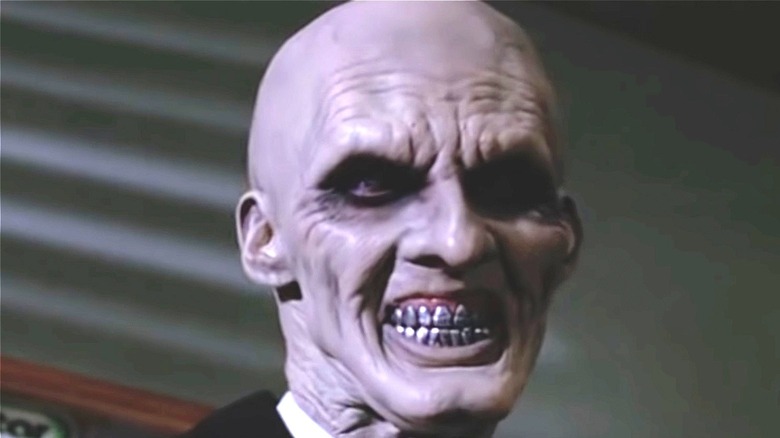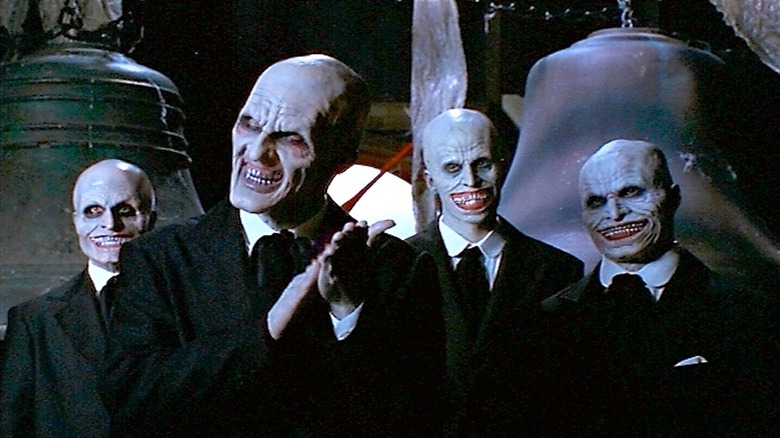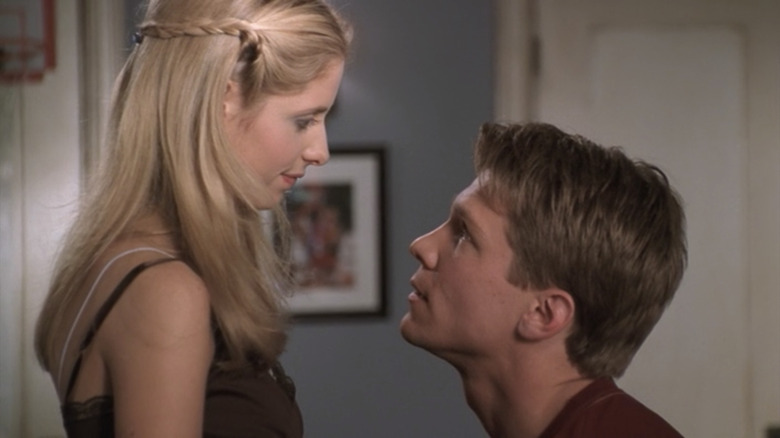The Gentlemen In Buffy Explained
The supernatural drama series "Buffy the Vampire Slayer" turned upside-down universally accepted horror tropes by making the last girl the "Chosen One." Buffy Summers (Sarah Michelle Gellar), who is imbued with strength, speed, countless quips, and a small arsenal of deadly weapons, saves the world "a lot." The series, created by Joss Whedon, ran for seven seasons and remains a cult classic, spawning comic books, the spin-off "Angel," and an entire Buffyverse along with endless promises of a reboot or revival.
Throughout its run, "Buffy the Vampire Slayer" featured a wide array of monsters — some even human — which went outside the immediate purview that the title suggests. Each season culminated in Buffy facing off with a big bad whose reach is felt in one overreaching story arc, such as Season 1's The Master, Season 2's Angelus, Season 5's Glory, and Season 7's The First.
However, some of the show's most memorable villains made one-off appearances in a single episode. That monster-of-the-week format kept things simple, with the motive usually being vengeance, destruction, and possible world domination. In Season 4, the show introduces a different kind of monster, or should we say monsters — and that's the creepy, pale-faced, gang of heart snatchers known as the Gentlemen.
The Gentlemen in Buffy are fairy-tale creatures
"Buffy the Vampire Slayer" Season 4, Episode 10, "Hush," introduces "The Gentlemen," whose arrival is foreshadowed by one of the Slayer's prophetic dreams. A young girl sings the lyrics to a creepy nursery rhyme promising "The Gentlemen are coming by ..." and warns, "You're gonna die screaming, but you won't be heard ...."
The Gentlemen, clad in matching suits with smiles that reveal rows of metallic teeth, are accompanied by some Renfield-like characters clad in straitjackets. These monstrous beings, who levitate around with no sense of urgency and communicate with hand and head gestures, use a small wooden box to steal all the residents of Sunndydale's voices, both human and demon. Panic ensues as Sunnydale falls silent, but the terror only truly begins when the Gentlemen dispatch their goons and go seeking out victims — who will see their hearts removed with a scalpel.
Giles (Anthony Stewart Head) explains that The Gentlemen are fairytale creatures who come to a town searching for seven hearts, stealing voices so their victims can't scream. Giles says no sword can kill the Gentlemen, "but the princess screamed once, and they all died." Buffy is the princess in this very grim fairytale, which sort of contradicts her legacy as a feminist icon. The episode ends with Buffy and love interest Riley Finn (Marc Blucas) battling the Gentlemen in a clocktower, emerging victorious after Riley destroys the box and Buffy's screams cause the heads of the Gentlemen to explode.
The Gentlemen steal voices and hearts
What happens once the Gentlemen get all the hearts — or why they need to collect hearts, for that matter — isn't explained or explored in their appearance on "Buffy the Vampire Slayer." The folklore isn't as crucial, though, so much as how the Gentlemen drive the narrative forward, through their ability to steal voices. Buffy and Riley can't communicate about their secret identities, and a lengthy conversation is replaced by a series of events, culminating in the big reveal in the clocktower. Their facial expressions relay everything they're thinking more accurately and succinctly than any monologue could.
Also unspoken is the burgeoning attraction between Willow Rosenberg (Alyson Hannigan) and Tara Maclay (Amber Benson), which bubbles to the surface when confronted with death. Whereas Buffy relinquishes some of her power to the oppressive Gentlemen, Willow and Tara find strength in their largely unexplored emotional and physical connection.
The episode speaks less to the notion of constructing complex villains with a compelling backstory, and more to Joss Whedon's desire to stretch his storytelling capabilities beyond producing television he categorized as "radio with faces," according to the DVD audio commentary (via Slate). Whedon's goal was to illustrate that "When people stop talking, they start communicating."


